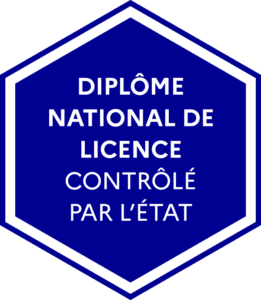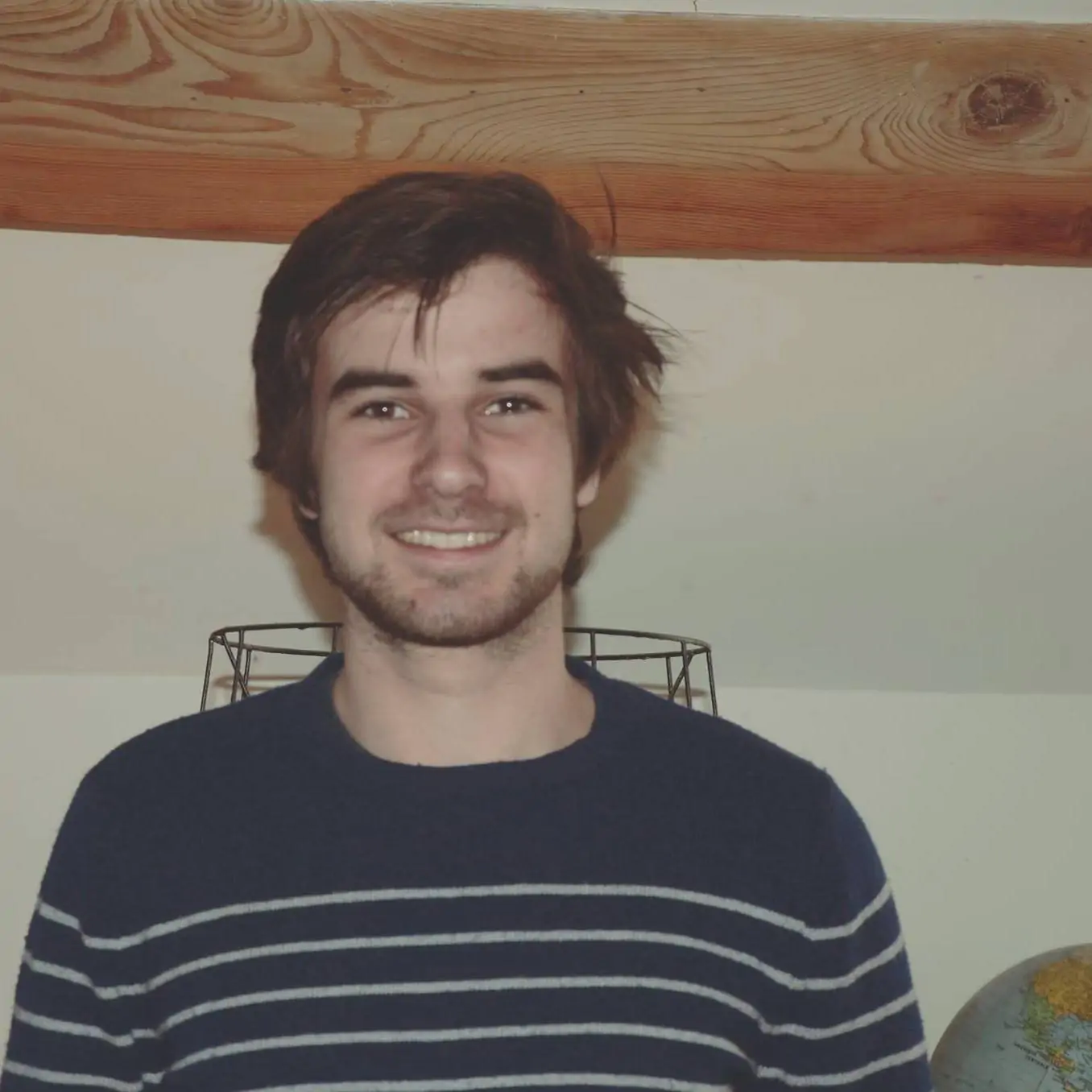Diplôme national en convention avec l’Université Polytechnique Hauts-de-France
Licence sciences – technologies – santé / mention informatique
Diplôme national en convention avec l’Université Polytechnique Hauts-de-France
Licence sciences – technologies – santé / mention informatique

Diplôme national en convention avec l’Université Polytechnique Hauts-de-France
Licence sciences – technologies – santé / mention informatique
✅ Pour acquérir et consolider des bases solides et diversifiées en informatique (langages de programmation, technologies, découverte des métiers, des spécialités…)
✅ Pour faire les bons choix en accord avec ses envies et ses ambitions
✅ Pour bien se préparer à une poursuite d’études en Master ou en Ecole d’ingénieurs, en cohérence avec son projet professionnel
✅ Un enseignement théorique permettant à l’étudiant de développer sa capacité d’analyse, son esprit logique durant les cours, TP et TD
✅ Un enseignement pragmatique, faisant une large place à l’autonomie et la créativité
✅ Un enseignement en partie en mode projet, afin de mieux se préparer au monde de l’entreprise
✅ Apprendre «en faisant» lors des projets et des travaux pratiques avec des professionnels de l’informatique Un accompagnement individuel pour aider l’étudiant à construire son projet personnel
✅ Des effectifs réduits : groupes de 30 étudiants (20 sur certaines matières ciblées en 1ère année)
✅ Possibilité de suivre la licence 3 en alternance ou en formation initiale
✅ Une admission prioritaire dans le Master Cyber de la FGES pour les étudiants ayant obtenu de bons résultats académiques en licence
La 3ème année de licence s’effectue soit en formation initiale, soit en alternance (sauf pour le parcours Gaming, uniquement en formation initiale). C’est l’étudiant qui décide de la formule d’enseignement. C’est aussi l’année où l’étudiant choisira son parcours de spécialisation :
En formation initiale, l’étudiant est en cours toute l’année puis effectue un stage de 6 semaines minimum.
En alternance, l’étudiant répartit son temps toute l’année entre cours et entreprise.
Focus sur l’alternance :
✅ Vos études sont financées par votre entreprise, vous êtes salariés et payés pendant votre cursus.
✅ L’alternance en licence sciences du numérique permet de se former aux différents métiers de l’informatique (développeur, développeur web, intégrateur, devops,…) et de s’intégrer plus facilement à la vie et à la culture de l’entreprise d’accueil.
✅ Le contrat d’apprentissage permettent d’alterner les périodes sur le terrain et des phases encadrées avec l’équipe pédagogique sous forme de cours théoriques, exercices, projets et travaux pratiques préparant au diplôme.
✅ Cette alternance permet également de progresser plus rapidement en confrontant ses connaissances théoriques avec la pratique du métier de manière constante et rapide.
✅ Le programme de formation est conçu de manière progressive pour être en corrélation avec les périodes en entreprise et assurer la mise en pratique.
✅ Le contrat d’apprentissage donne la possibilité à l’étudiant de se confronter au monde du travail, avant de choisir sa poursuite d’études en Master ou en Ecole.
✅ Cette alternance permet de muscler son C.V. : les alternants auront déjà une expérience professionnelle significative à la sortie de leur BAC+5.
Ce programme est susceptible d’évoluer.
La Licence 3 peut être suivie en formation initiale ou en alternance.
| BCC 1 – Appréhender les fondamentaux de l’informatique | ECTS |
| Remise à niveau en prog. | 0 |
| Fondamentaux de la prog. | 5 |
| Renforcement en prog. | 0 |
| Bases de données 1 (Knowledge) | 2 |
| Analyse de base | 5 |
| Renforcement en mathématiques | 0 |
| Représentation de l’information | 3 |
| Structures de données linéaires | 5 |
| Algèbre Matricielle | 3 |
| Outils d’analyse | 3 |
| BCC 2 – Adapter une posture professionnelle pour la gestion de projet | |
| Connaissance de l’entreprise | 2 |
| Formation Humaine | 2 |
| Anglais S1 | 2 |
| Projet Gaming S1 | 2 |
| Bases de données 1 (Maker) | 2 |
| Projet Gaming S2 | 2 |
| Anglais S2 | 2 |
| Formation Humaine | 2 |
| Stage en entreprise L1 | 0 |
| BCC 3 – Développer une solution informatique | |
| Techno Web Front | 2 |
| Système d’exploitation | 3 |
| Techno Web Dynamic Front | 4 |
| Réseaux | 4 |
| BCC 4 – Agir en éthique et responsable | |
| Philosophie de la technique | 1 |
| MOOC Oddyssée | 2 |
| MOOC Oddyssée | 2 |
| BCC 1 – Appréhender les fondamentaux de l’informatique | Crédits |
|---|---|
| Programmation Objet 1 | 5 |
| Structures de données avancées | 5 |
| Cryptologies | 2 |
| Algorithmes avancés | 5 |
| Théorie des langages | 3 |
| Réseaux | 3 |
| BCC 2 – Adapter une posture professionnelle pour la gestion de projet | |
| Anglais S3 | 2 |
| Professionnalisation + Rapport de stage L1 | 3 |
| Techno Web Back-end (Maker) | 3 |
| Maker – Impression 3D | 2 |
| Gestion de projet Agile | 2 |
| Techniques de communication | 1 |
| Anglais S4 | 2 |
| Stage en entreprise L2 | 0 |
| BCC 3 – Développer une solution informatique | |
| Projet Gaming S3 | 2 |
| Techno Web Back-end (Knowledge) | 2 |
| Bases de données 2 | 2 |
| Architecture Système | 3 |
| IoT – Internet des Objets | 2 |
| Projet Gaming S4 | 2 |
| Programmation Objet 2 | 4 |
| Framework Web 1 | 3 |
| BCC 4 – Agir en éthique et responsable | |
| Éthique et numérique | 1 |
| Option au choix-S1 | 2 |
| Projet d’initiative | 3 |
| Option au choix-S2 | 2 |
| BCC 1 – Appréhender les fondamentaux de l’informatique | ECTS |
|---|---|
| Programmation Fonctionnelle | 3 |
| Recherche Opérationnelle | 3 |
| Probabilité – Statistique | 3 |
| Fondamentaux de la cybersécurité | 2 |
| Sciences des données | 2 |
| Recherche appliquée et Innovation | 2 |
| Méthodes numériques et simulation | 2 |
| Box certificative finale | 1 |
| BCC 2 – Adapter une posture professionnelle pour la gestion de projet | |
| Anglais S5 | 2 |
| Stage (Rapport + Soutenance) | 3 |
| Données – Modélisation (UML) | 3 |
| DataViz | 2 |
| Gaming S5 | 4 |
| UI/UX Design | 4 |
| Cloud Computing | 2 |
| Fondamentaux de la gestion de projet | 2 |
| Anglais S6 | 2 |
| Alternance ou PPP | 4 |
| Box certificative finale | 1 |
| BCC 3 – Développer une solution informatique | |
| Conception de logiciels | 2 |
| Gaming S6 | 4 |
| Sécurité | 2 |
| Framework Web 2 | 2 |
| Design Pattern | 2 |
| Bases de données 3 | 2 |
| Projet IA | 4 |
| Projet Cyber | 3 |
| Box certificative finale | 1 |
| BCC 4 – Agir en éthique et responsable | |
| Approche philosophique de l’IA | 1 |
| Box certificative finale | 1 |
Semestre 5 : Sciences des données (2 ECTS)
Semestre 5 : Dataviz (2 ECTS)
Semestre 6 : Projet IA (4 ECTS)
Semestre 5 : Fondamentaux de la cybersécurité (2 ECTS)
Semestre 6 : Sécurité (2 ECTS)
Semestre 6 : Projet Cyber (4 ECTS)
Semestre 5 : Gaming (4 ETCS)
Semestre 6 : Gaming (4 ETCS)
✅ Licence 1 : stage, mission d’exécution de 4 semaines minimum
✅ Licence 2 : stage de technicien de 4 semaines minimum
✅ Licence 3 : en formation initiale : stage d’orientation professionnelle de 6 semaines minimum / ou en formation en alternance : en contrat de professionnalisation ou en apprentissage tout au long de l’année
✅ Rythme d’alternance en L3 : lundi, mardi et cours et mercredi, jeudi, vendredi en entreprise. En entreprise de juin à août.
✅ Lycéens du Bac général, spécialité « Informatique » (NSI) et « Mathématiques » ou « Mathématiques complémentaires »
✅ Lycéens du Bac général, spécialité « Mathématiques » ou « Mathématiques complémentaires »
Les étudiants qui nous rejoignent veulent s’investir dans des projets concrets et approfondir leurs connaissances en programmation, web, bases de données, administration système ou réseaux, sécurité…
Des étudiants titulaires d’une L1 en informatique ou sciences pour l’ingénieur, d’un BTS SIO ou ex IRIS
Des étudiants titulaires d’une L2 en informatique ou d’un DUT informatique
La totalité du processus de candidature se fait via la plateforme Parcoursup
Les élèves de Terminale souhaitant candidater en première année doivent suivre la procédure Parcoursup.
Il leur sera demandé de constituer un dossier avec un CV, une lettre de motivation et leurs résultats de 1ère et de Terminale.
Le processus de sélection est le suivant. Les candidats seront sélectionnés après étude de leur dossier.
Par ailleurs, des frais de dossier seront demandés à hauteur de 70 € par candidature (ex : si un lycéen candidate à 2 formations chez nous, il devra s’acquitter de 140 € de frais et ainsi de suite…). Ces frais seront remboursés dans leur totalité si le candidat s’inscrit définitivement à la FGES. Les boursiers sont exemptés de ces frais de dossier.
Vous venez d’un établissement extérieur et vous souhaitez continuer vos études, en Licence 2 ou Licence 3 ? Rendez-vous sur notre site Espace Admission pour candidater.


lucien.mousin@univ-catholille.fr
13 Rue de Toul 59000 Lille
177 All. Clémentine Deman, 59000 Lille
Tél. : 03 20 13 40 20 (Licences)
Tél. : 03 28 38 48 94 (Masters)

